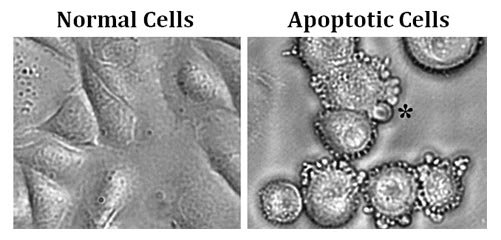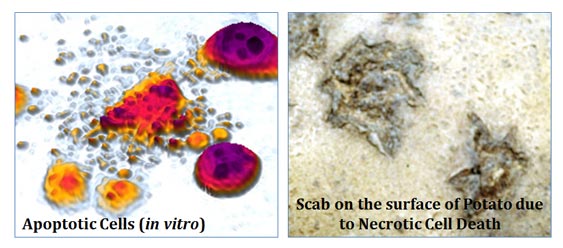Apoptosis vs Necrosis
Apoptosis and Necrosis
Apoptosis and Necrosis are two types of cell death occur in organisms. The cells undergo death when the cell death becomes necessary as a part of developmental process or they fail to adapt to injuries. Both these types of cell deaths differ in their initial cause and progression of the cell death pathway.
Apoptosis definition (programmed cell death): a physiological process by which unwanted or useless cells are eliminated during the development and other normal biological processes. Often found during tissue homeostasis, embryogenesis, immunological reactions and development of nervous systems. During apoptotic cell death, the cells undergo some characteristic events such as chromatin condensation, nuclear and cytoplasmic aggregation and partitions of cytoplasm and nucleus into membrane bound vesicles called apoptotic bodies containing ribosomes and mitochondria. Apoptotic bodies are recognized and phagocytized by either by macrophages or adjacent cells and thus no inflammatory response are elicited during apoptotic cell death.
| You may also like NOTES in... | ||
|---|---|---|
| BOTANY | BIOCHEMISTRY | MOL. BIOLOGY |
| ZOOLOGY | MICROBIOLOGY | BIOSTATISTICS |
| ECOLOGY | IMMUNOLOGY | BIOTECHNOLOGY |
| GENETICS | EMBRYOLOGY | PHYSIOLOGY |
| EVOLUTION | BIOPHYSICS | BIOINFORMATICS |
Necrosis definition: (accidental cell death) a pathological process occurs when the cells are exposed to serious physical or chemical insults. Occur during pathological infections such as bacterial and fungal infections, hypothermia and hypoxia conditions. The cell and cellular organelles swell and ruptures to release the entire cell content including lysosomal enzymes into the extracellular fluid. Due to this, necrotic cell deaths are always associated with severe inflammatory response in the surrounding tissues.
The current post describes the similarities and difference between apoptotic and necrotic cell death with a comparison table.
Similarities between Apoptosis and Necrosis
Ø Both apoptosis and necrosis are cell death pathways in organisms
Ø Both are characterized by profound membrane dysfunctions
Ø Both are characterized by mitochondrial dysfunctions
Ø In both apoptosis and necrosis, the DNA get fragmented
Ø The remnants of both apoptotic and necrotic cell death are phagocytosed
Ø Apoptosis and necrosis occurs both in plants and animals (mechanism varies)
Ø Both apoptosis and necrosis are absent in prokaryotic cells

(image source cc wikipedia)
Difference between Apoptosis and Necrosis
Sl. No. Apoptosis Necrosis
1 Apoptosis is a ‘programmed’ cell death Necrosis is a ‘premature’ cell death
2 Apoptosis is a highly regulated timely event Necrosis is an unregulated random event
3 Genetically Controlled Not Genetically controlled
4 Apoptosis is a pre-planned cell death pathway Necrosis is not a pre-planned cell death pathway
5 Apoptotic cell deaths are natural/normal Necrotic cell deaths are always pathological (not natural)
6 Apoptotic cell death usually do not require any treatment Necrotic cell death are not naturals and always require proper treatment
7 Apoptotic cell deaths are usually beneficial to the organisms Necrotic cell deaths are always detrimental to the organisms
8 Apoptotic cell death is initiated by self-generated signals from inside or outside the cells Necrotic cell death always occurs after signals from external agents such as fungal or bacterial toxins
9 Shrinkage of cells occurs during apoptosis Swelling of cells occurs during necrosis
10 Membrane blebbing occurs during apoptotic cell death No membrane blebbing but the membrane get disrupted during necrotic cell death
11 Chromatin condensation is a hallmark of apoptosis No chromatin condensation occurs during necrosis
12 Nucleus get fragmented Nucleus get disorganized
13 Apoptotic bodies are formed during apoptotic cell death No such necrotic bodies are formed during necrosis
14 Usually apoptotic cell death is devoid of any physical symptoms Severe inflammatory symptoms are evident in the neighboring cells after necrotic cell death
15 No inflammation occurs in the surrounding tissues Cause severe inflammation in the surrounding tissues
16 Cell undergoing apoptosis are actively take part in cell death pathway Cells undergoing necrosis do not take part in any events in the death pathway
17 An active process hence require energy from ATP molecules A passive process and do not require ATP
18 Since it is an active process, apoptosis does not occur at 4oC Since it is a passive process, necrosis can also occur at 4oC
19 Phagocytosis of the cell remnants are done by the adjacent cells or macrophages Phagocytosis of the cell remnants are always done by the macrophages
20 The integrity of lysosomes are preserved in apoptotic cell death The integrity of lysosomes are compromised during necrotic cell death, lysosome leakage occurs
21 The integrity of mitochondria usually lost during the initial phases of apoptosis The integrity of mitochondria usually maintained during the initial phases of necrotic cell death
22 Apoptosis is a Caspase dependent cell death pathway Necrosis is a Caspase independent cell death pathway
23 Activation and participation of many Cascase enzymes are involved in apoptosis No Caspase enzymes are involved in necrosis
24 Externalization of phosphatidyl serine from inner to the outer leaflet of plasma membrane occurs No such flipping of plasma membrane occurs during necrotic cell death
25 DNA fragmentation is pre-lytic (before cell lysis) in apoptosis DNA fragmentation is post lytic (after cell lysis) in necrosis
26 DNA is fragmented between nucleosomes and hence a ladder like pattern is formed after the agarose gel electrophoresis of total DNA extract DNA fragmentation is random and hence not ladder but a smear like pattern is formed after agarose gel electrophoresis of total DNA extract
27 Release of cytochrome C and AIF from the mitochondria to the cytoplasm of cells occurs No such events are reported in necrosis
28 pH of the cells changes to acidic during apoptosis There is no change in the pH of the cells during necrosis
29 Apoptosis ends in fragmentation of cells into smaller bodies (apoptotic bodies) Necrosis ends in total lysis of the cells
30 Usually apoptotic cell death occurs in individual cells Usually a group of cells undergo necrotic cell death

(image source cc Wikipedia)
You may also like…

very self explanatory,good content
Thanks for the update.